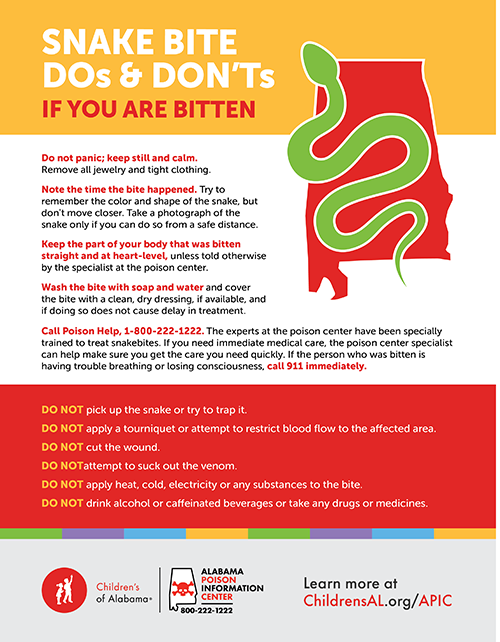Comprehensive Snakebite Program
 The Comprehensive Snakebite Program is one of the first in the United States. The program includes the nation’s first dedicated snakebite follow up clinic, which treats patients in the hospital and provides follow up care. The multidisciplinary approach is crucial and includes uses members from the Alabama Poison Information Center (APIC) and medical toxicologists, wound care physicians, pharmacists, clinical toxicologists, hospitalists and physical therapists. The team also focuses on researching and developing new protocols in snakebite care.
The Comprehensive Snakebite Program is one of the first in the United States. The program includes the nation’s first dedicated snakebite follow up clinic, which treats patients in the hospital and provides follow up care. The multidisciplinary approach is crucial and includes uses members from the Alabama Poison Information Center (APIC) and medical toxicologists, wound care physicians, pharmacists, clinical toxicologists, hospitalists and physical therapists. The team also focuses on researching and developing new protocols in snakebite care.
In the United States, most snakebites are caused by the Crotalidae family of snakes, also known as pit vipers. Among pit vipers are rattlesnakes, copperheads, and water moccasins. More than half of bites by pit vipers result in envenomation, or poisoning, which happens when snakes emit venom into the bite wound, causing toxins to enter the body. Because it is often difficult to identify snakes to determine if they are non-venomous, all snakebites should be considered venomous and treated as a medical emergency. A delay in getting treatment can result in serious injury or, in rare cases, death.
Snakebite poisoning causes a variety of symptoms:
- Severe pain and swelling at the wound site
- Nausea and vomiting
- Blurred vision
- Thirst
- Difficulty breathing
- Sweating
- Muscle cramps and weakness
- Dizziness
- Numbness in face and limbs
- Shock, a condition caused by lack of blood flow, which damages organs by depriving them oxygen and nutrients
Toxins from snakebite poisoning can cause coagulopathy, or thinning of the blood, which decreases the blood’s ability to clot. Coagulopathy may result in uncontrolled internal or external bleeding, causing cause damage to joints, muscles, or internal organs. Long-term effects of snakebites include chronic limb swelling, wounds, and muscle damage.
Venomous snakebites are treated with antivenom, which is a medicine used to stop snake venom from binding to tissues and causing serious blood, tissue, or nervous system conditions. The use of antivenom depends on how much poison was injected and the type and size of the snake. Antivenom is the only specific treatment that can help prevent or reverse most of the effects of snakebite toxins when used early.
In addition to antivenom, additional treatment such as artificial respiration, kidney dialysis, wound care, and comprehensive rehabilitation services are needed to effectively treat snakebite.
Treatment may continue after hospital discharge. Outpatient follow up is available at the UAB Comprehensive Wound Care Clinic, where specialists work closely with the APIC for long-term lab monitoring of potential venom injury while providing strategies for treatment of limb swelling and localized wound care. Physical therapy is available for those patients who require improved limb function recovery.
In addition to providing world-class clinical services, the Comprehensive Snakebite Program is committed to advancing research and care in the field.
Directors:
• Dag Shapshak MD, co-director
• William Rushton MD, co-director
Clinical/Medical Toxicologists:
• Sukhi Atti MD, medical toxicologist
• Jessica Rivera Pescatore PharmD, clinical toxicologist
• Ann Slattery DrPH, RN, RPh, clinical toxicologist, managing director Alabama Poison Information Center
Wound Experts:
• Christopher Greene MD, wound care specialist
• Matt Kelly MD, wound care specialist
• Benjamin Von Schweinitz MD, wound care specialist
• Patrick Siler MD, wound care specialist
• Mathew Delaney MD, wound care specialist
• Erin Delaney MD, wound care specialist
• Marty Vandernoot MD, wound care specialist
Research specialists:
• Michael Kurz MD
• Max Thompson MD
• John Gullett MD
• Keith Knight – Russell Clinic Manager
https://www.uabmedicine.org/patient-care/treatments/uab-comprehensive-snakebite-program










